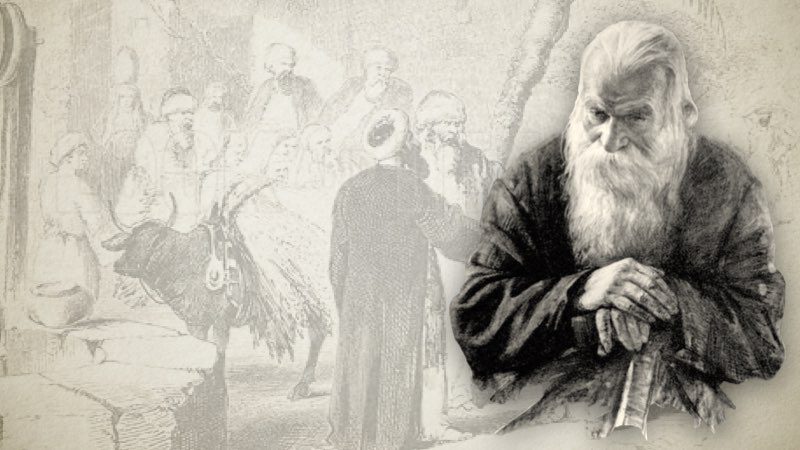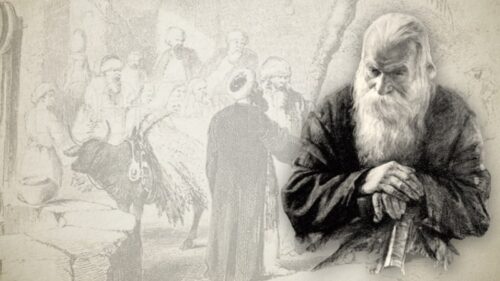
2. The Terms Elder, Bishop And Pastor Are Not Interchangeable
When the term elder is used within Christian circles, it conjures up ideas of ecclesiastical clergy, either elected to office by the congregation, or appointed to office by the denomination. In fact, it is only within Christian churches that the term elder is made to mean something other than persons honored in virtue of their age, wisdom and influence. This irregular interpretation is rooted in a flawed hermeneutic of several biblical texts which refer to elders. It is assumed, because a few scripture passages use the term elder when identifying a bishop/pastor, that therefore, most (if not all) references to elders in the early churches must be bishops/pastors.
The absurdity of this presupposition is comparable to one who boasts that all disciples must be apostles, because both terms are used by Christ to identify the same group of men—Matthew 10:1,2: “And when he had called unto him his twelve disciples, he gave them power against unclean spirits, to cast them out, and to heal all manner of sickness and all manner of disease. Now the names of the twelve apostles are these…” Obviously, the term disciple is a generic title that refers to all Christians, whereas the term apostle is an official title that refers to twelve men set apart by Christ to a special office. While it is perfectly true that these twelve men could be identified as disciples or apostles, it is not accurate to draw the conclusion that the terms are interchangeable—For although all apostles are by necessity disciples, not all disciples are apostles. The same is true when the scriptures use the terms elder and bishop/pastor. The term elder is a generic title that refers to all household and community leaders (patriarchs/matriarchs), whereas the terms bishop/pastor are official titles that refer to men who have been set apart by Christ to a special office. While it is perfectly true that these men could be identified as elders or bishops/pastors, it is not accurate to draw the conclusion that the terms are interchangeable—For although all bishops/pastors are by necessity elders, not all elders are bishops/pastors. Most elders (household heads—fathers/mothers; aged widows/singles) in a church are spiritual and share natural leadership qualities, but they are not gifted by Christ to serve as bishops/pastors. Those that Christ does gift to serve as bishops/pastors are by necessity elders already: not because they have been elected or appointed as such, but because they are husbands/fathers overseeing their own households.
This interpretation is affirmed in 1 Timothy 3:1-13, where the term elder does not appear, but the official titles of bishop and deacons do. One of the central qualifications for both offices (bishop and deacons) is that the candidate must be a faithful elder (household head)—1 Timothy 3:1-7: “…A bishop then must be blameless, the husband of one wife…one that ruleth well his own house, having his children in subjection with all gravity; (for if a man know not how to rule his own house, how shall he take care of the church of God?)…”; 1 Timothy 3:8-13: “Likewise must the deacons be…the husbands of one wife, ruling their children and their own houses well…” In fact, when Paul identifies the offices by title in Philippians 1:1, he uses the proper titles for each office—“the bishops and deacons”.
Therefore, when the term elder is used with reference to the early churches, it is incorrect to assume they are one and the same with bishops/pastors. Unless the text identifies the elder as such, a consistent exegesis requires the term to be understood as the unofficial leaders (household heads) of the congregation. As it falls outside the scope of this pamphlet to give an exposition for each text[1], I simply list the following scriptures as referring to the unofficial leaders (household heads), rather than the official leaders (bishops/pastors): Acts 11:30; 14:23; 15:2-16:4; 21:18; 1 Tim 4:14; 5:1,2,17,19; Tit 2:2,3; Philemon 9; 1 Pet 5:1,5; James 5:14; 2 Jn 1; 3 Jn 1. Of course, objections to my interpretation will be raised immediately with regards to passages such as Acts 14:23, 1 Timothy 4:14; 5:17,19; 1 Peter 5:1,5; James 5:14. This is perfectly natural— when the mind has been conditioned to view the term elder as one and the same with bishop/pastor, it is difficult to read these texts and not be influenced by that presupposition. However, I ask the reader to consider these passages in light of what has been pointed out concerning the meaning of elder and its use throughout the Old and New Testaments—the only consistent interpretation would be to view these elders as household heads, not bishops/pastors.
There are only two texts which use the term elder when identifying those serving as bishops/pastors:
1. The Church at Ephesus.
Acts 20:17-28: “And from Miletus he sent to Ephesus, and called the elders of the church. And when they were come to him, he said unto them…Take heed therefore unto yourselves, and to all the flock, over the which the Holy Ghost hath made you overseers, to feed the church of God, which he hath purchased with his own blood.”
The following points should be noted: First, Luke used the term elder in the context of his narrative, whereas Paul used the term overseer (bishop) in his speech to the officers—While the two terms refer to the same group of men, it was Luke who called them elders, not Paul; Second, it was not inaccurate to identify the bishops as elders, for they no doubt retained that distinguished honor as household heads even after they were appointed to the office of bishop; Third, the use of the two terms together does not mean elder and bishop are interchangeable titles.
2. The Churches at Crete.
Titus 1:5-9: “For this cause left I thee in Crete, that thou shouldest set in order the things that are wanting, and ordain elders in every city, as I had appointed thee: if any be blameless, the husband of one wife, having faithful children not accused of riot or unruly. For a bishop must be…”
The following points should be noted: First, the Apostle Paul uses the terms elder and bishop to identify the same group of men; Second, as in the Ephesus example or elsewhere, it was not inaccurate to identify the bishops as elders, for they no doubt retained that distinguished honour as household heads even after they were appointed to the office of bishop, and; Third, the use of the two terms together does not mean elder and bishop are interchangeable titles; Fourth, when Paul highlights the qualifications for the office (similar to those in 1 Timothy 3:1-7), he uses the proper title identifying that office—“bishop”.
In summary, the terms elder, bishop and pastor are not interchangeable. The term elder is a title of honor given to those who are older, whereas the term bishop is a title of office identifying persons appointed to serve as officers. Although eldership advocates claim the New Testament frequently uses the term elder when referencing bishops/pastors serving the early churches, there are actually only two instances when this occurs. From this standpoint, in scripture, when referring to the pastoral office, the title ‘bishop’ is used more frequently than the title ‘elder’. Hence, this leads to the third reason why Baptist churches should not appoint elders—Evangelists, Bishops and deacons are the only permanent offices recognized in the New Testament.
——————————-
[1] My forthcoming book provides a full explanation for every text referencing elders.
Jared Smith served twenty years as pastor of a Strict and Particular Baptist church in Kensington (London, England). He now serves as an Evangelist in the Philippines, preaching the gospel, organizing churches and training gospel preachers.
Jared Smith's Online Worship Services
Jared Smith's Sermons
Jared Smith on the Gospel Message
Jared Smith on the Biblical Covenants
Jared Smith on the Gospel Law
Jared Smith on Bible Doctrine
Jared Smith on Bible Reading
Jared Smith's Hymn Studies
Jared Smith on Eldership
Jared Smith's Studies In Genesis
Jared Smith's Studies in Romans
Jared Smith on Various Issues
Jared Smith, Covenant Baptist Church, Philippines
Jared Smith's Maternal Ancestry (Complete)




